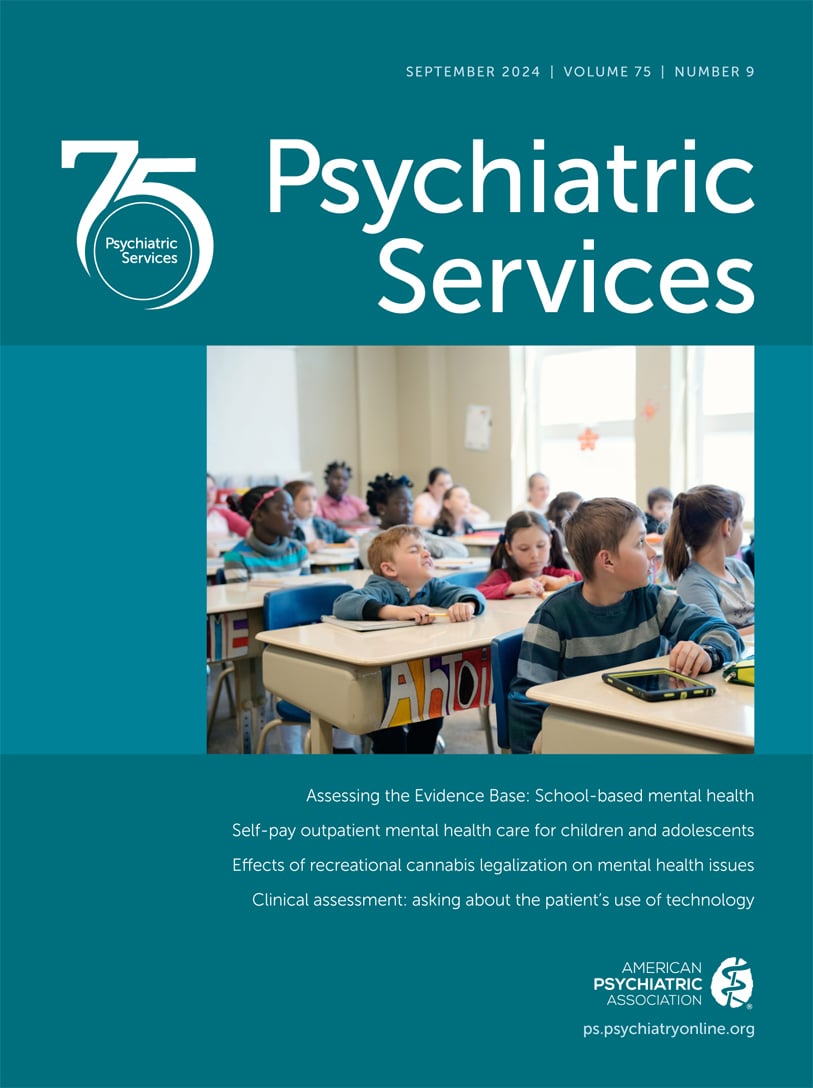Psychiatric Services
- Volume 74
- Number 4
- April 2023
Taking Issue
Articles
Publication date: 09 November 2022
Pages332–340Objective: This study examined trends in receipt of smoking cessation medications among smokers with and without mental illness, including serious mental illness, from 2005 to 2019 and characterized physician attitudes and practices related to tobacco ...
https://doi.org/10.1176/appi.ps.202100690Publication date: 13 October 2022
Pages341–348Objective: The adverse consequences of untreated perinatal depression highlight the need to identify populations to target in order to increase treatment rates. The authors sought to evaluate treatment initiation for a new diagnosis of depression during ...
https://doi.org/10.1176/appi.ps.20220173Publication date: 25 January 2023
Pages349–357Objective: Despite robust evidence for efficacy of measurement-based care (MBC) in behavioral health care, studies suggest that adoption of MBC is limited in practice. A survey from Blue Cross–Blue Shield of North Carolina was sent to behavioral health ...
https://doi.org/10.1176/appi.ps.202100735Publication date: 06 September 2022
Pages358–364Objective: In this study, the authors assessed return on investment (ROI) associated with a forensic assertive community treatment (FACT) program. Methods: A retrospective secondary data analysis of a randomized controlled trial comprising 70 legal-involved ...
https://doi.org/10.1176/appi.ps.20220186Publication date: 09 November 2022
Pages365–373Objective: Individuals with serious mental illness have a high prevalence of tobacco use disorder and related early mortality but underutilize smoking cessation medication. The authors determined whether clinician-delivered education to primary care ...
https://doi.org/10.1176/appi.ps.20220187Publication date: 04 January 2023
Pages374–380Objective: Adolescents with behavioral health disorders (i.e., mental health disorders and substance use) often experience frequent recurrence of symptoms, suggesting a need for an ongoing behavioral health intervention, rather than a single course of ...
https://doi.org/10.1176/appi.ps.202100513Reviews & Overviews
Publication date: 21 September 2022
Pages381–392Objective: Psychiatric advance directives (PADs) are documents that allow users of mental health services to express their preferences for treatment in future mental health crises. To increase the use of PADs in psychiatric practice, it is helpful to ...
https://doi.org/10.1176/appi.ps.202200003Special Articles
Publication date: 15 November 2022
Pages393–400Mobile health (mHealth)—that is, use of mobile devices, such as mobile phones, monitoring devices, personal digital assistants, and other wireless devices, in medical care—is a promising approach to the provision of support services. mHealth may aid in ...
https://doi.org/10.1176/appi.ps.202200011Publication date: 27 September 2022
Pages401–406Recognition has grown that peer support workers serve an important role in facilitating decision making about treatment and recovery among people with mental health conditions. This article provides examples of peer-facilitated decision support ...
https://doi.org/10.1176/appi.ps.20220086Brief Reports
Publication date: 27 September 2022
Pages407–410Objective: The authors tested whether natural language processing (NLP) methods can detect and classify cognitive distortions in text messages between clinicians and people with serious mental illness as effectively as clinically trained human raters. ...
https://doi.org/10.1176/appi.ps.202100692Publication date: 13 September 2022
Pages411–414Objective: This study examined differences between certified community behavioral health clinics (CCBHCs) and community mental health centers (CMHCs) in the services offered and populations served. Methods: Data from the 2020 National Mental Health Services ...
https://doi.org/10.1176/appi.ps.20220211Publication date: 27 July 2022
Pages415–418Objective: This study examined the descriptive terms used in referring to homeless populations. Methods: Data were from a 2020 national survey of 6,607 middle- and low-income U.S. adults with or without lived experiences of homelessness and a 2021 survey of ...
https://doi.org/10.1176/appi.ps.202100708Publication date: 21 September 2022
Pages419–422Objective: This study evaluated the effects of Safe Alternatives for Teens and Youths–Acute (SAFETY-A), a brief strengths-based, cognitive-behavioral family intervention, on racial-ethnic minority youths receiving emergency department (ED) treatment for ...
https://doi.org/10.1176/appi.ps.20220129Publication date: 27 September 2022
Pages423–426Objective: This study examined the impact of high-reliability changes to how measurement-based care questionnaires were administered to patients on rates of questionnaire completion. Methods: Medical record data were abstracted from 44,305 adult outpatient ...
https://doi.org/10.1176/appi.ps.202200032Commentary
Open Forum
Publication date: 21 September 2022
Pages431–433The field of psychiatry has placed a growing emphasis on research-based diagnostic and treatment practices related to mental illness. Involuntary hospitalization is a controversial and potentially lifesaving intervention in psychiatric care; yet, to what ...
https://doi.org/10.1176/appi.ps.20220296Publication date: 02 November 2022
Pages434–436In 2021, the British Columbia (BC) Interior experienced a series of unprecedented disasters, ranging from extreme heat and wildfires to catastrophic flooding and evacuations. Along with these severe weather events, BC was affected by COVID-19 outbreaks ...
https://doi.org/10.1176/appi.ps.20220281Promoting High-Value Mental Health Care
Publication date: 27 September 2022
Pages437–440Adolescents and young adults frequently experience anxiety and depression. The authors evaluated engagement in and effects of a coach-enhanced digital cognitive-behavioral intervention (dCBI; RxWell) targeting emotional distress in this age group. The ...
https://doi.org/10.1176/appi.ps.202200045Law & Psychiatry
Publication date: 23 February 2023
Pages441–443Violence by patients is common in psychiatric facilities. Under federal law, however, employers are charged with taking steps to protect worker safety. A recent case from a psychiatric hospital in Colorado illustrates how the Occupational Safety and ...
https://doi.org/10.1176/appi.ps.20230036Past Issues
View Issues Archive
Vol. 75 | No. 12

Vol. 75 | No. 11

Vol. 75 | No. 10
